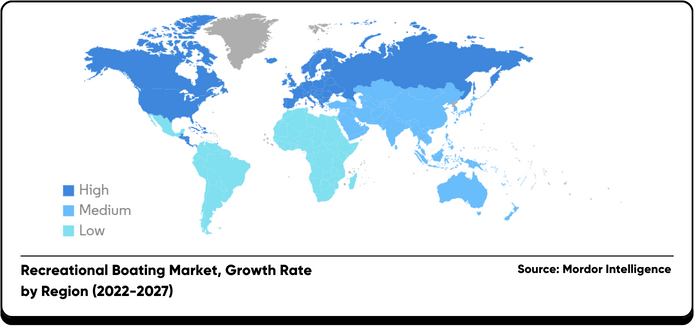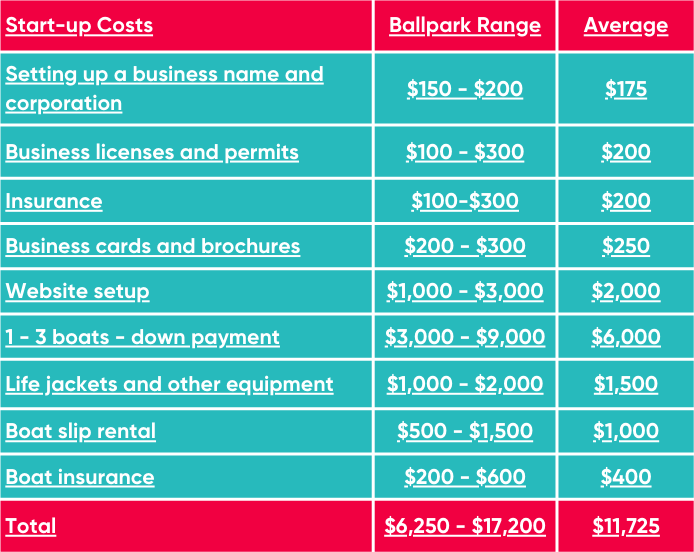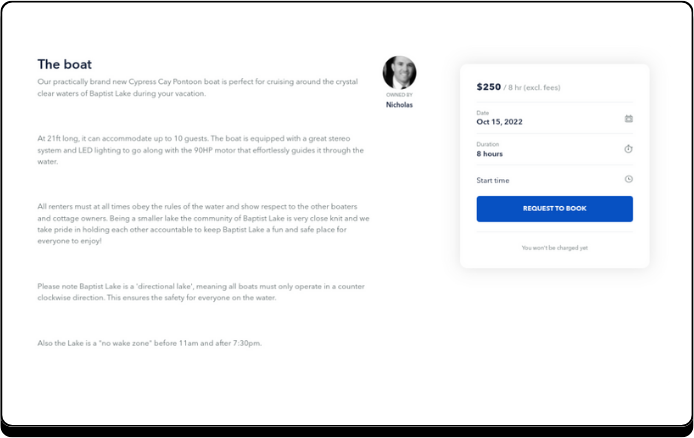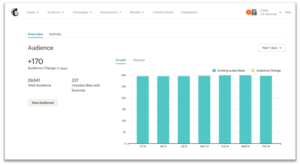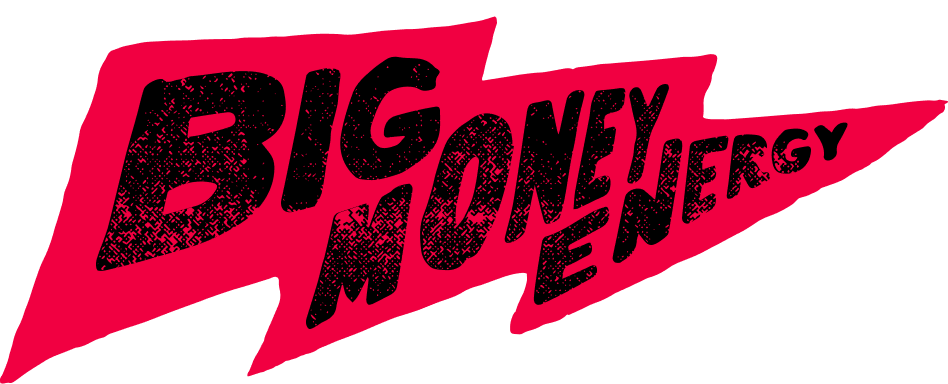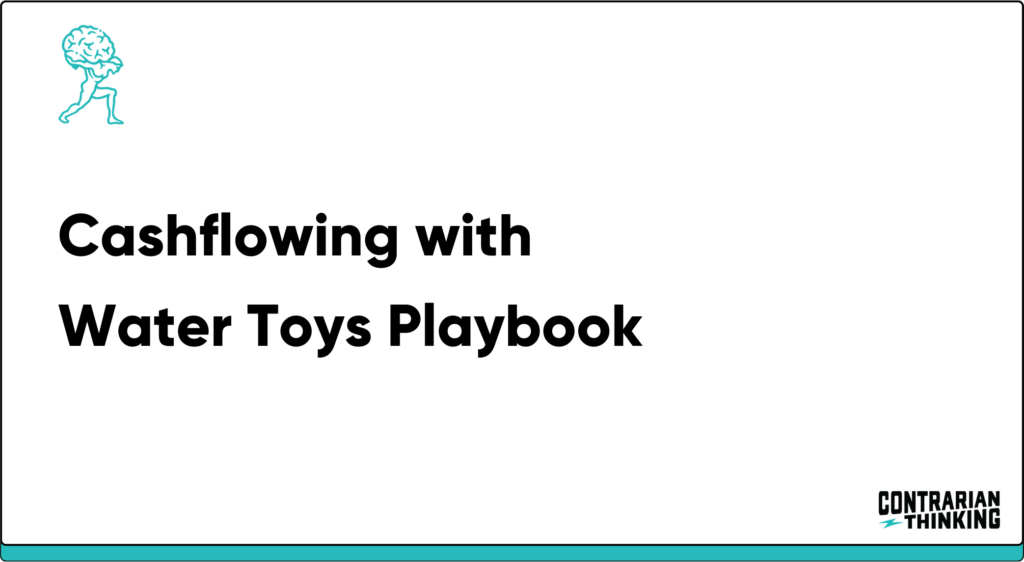
Intro
A review of the opportunity
The recreational boating industry is insane right now! With a total economic impact of over $170.3 billion, supporting over 691,000 jobs and generating $39 billion in labor income, it’s clear that this is one of the best ways to make money in the outdoors.
This month, we’re talking all about how you can make significant income in the boat rental industry..
Summary
Dive into Boating… Become drenched in profits.
The boat rental market is growing by leaps and bounds. The growth is spurred by factors such as the increasing popularity of recreational boating, rising disposable incomes, and the growing number of tourists seeking water-based activities.
Believe it or not, when the pandemic hit, the boating business saw a boom due to people social distancing on the open waters. This boom continued post-pandemic and brought more opportunities to start earning additional income by utilizing your own boat. Capitalizing on these opportunities, the boating industry, also known as RV-ing on Waters, provides many monetary gains for individuals looking to own an income-generating investment on the water.

Boating rentals and boat membership programs are predicted to grow exponentially in the coming years. According to the Bureau of Economic Analysis, the largest outdoor recreation activity in the U.S. alone is leisure boating and fishing!
The best part is that listing boats is as simple as using one website to handle vetting clients, cash deposits, and hiring a captain for your vessel.
Playbook
If you already happen to have a boat, renting it out is a great way to offset the costs of ownership. If you don’t currently own a boat, there is a great opportunity to purchase and rent out your boat to bring in some serious cash. Owning a boat rental company can come with several benefits, including:
- Income potential: A successful boat rental company can generate significant income for the owner, particularly during peak boating season or in popular tourist destinations.
- Flexibility: Boat rental businesses can offer flexible scheduling options for both the owner and customers, allowing for a work-life balance and the ability to set your own schedule.
- Low overhead costs: Boat rental companies often have lower overhead costs compared to other types of businesses, as they typically do not require a physical storefront or inventory.
- Customer relationships: Owning a boat rental company can provide opportunities to build long-term relationships with customers, many of whom may become repeat renters or even boat buyers.
- Lifestyle benefits: For those who love boating, owning a boat rental company can provide a fulfilling and enjoyable lifestyle, allowing you to spend time on the water and share your passion with others.
- Tax benefits: Depending on the location and type of boat rental business, there may be tax benefits such as deductions for maintenance and repairs.
Here’s our step-by-step guide on how to a rental enterprise that creates wealth on the open seas.
Step 1: Purchase your boat(s)
If you already own your own boat and want to make some extra cash, then this can be a very simple process of listing your boat on an app. However, if you’re feeling more ambitious and want to start a larger operation with multiple boats, be aware that the cost per boat can be quite significant.
Here are a few things to consider when buying boats for a boat rental company:
- Determine your budget: Decide on the amount of money you are willing to spend on purchasing boats for your rental business. This will help you determine the type and number of boats you can afford.
- Research boat types: Research the types of boats that are suitable for your rental business. Consider factors such as the type of waterway you’ll be renting on, the number of passengers you want to accommodate, and the types of activities your customers will be interested in. Beyond typical motor and sailboats, you may also want to consider these different types of watercraft that you can also rent kayaks, pontoon boats, houseboats, or other more unique types of boats. We’ve even seen hot tub boat rental companies!
- Research boat manufacturers and models: Look for reputable boat manufacturers that produce high-quality, reliable boats. Research different models and compare features, specifications, and pricing.
- Contact dealers or brokers: Once you have a list of potential boats, contact dealers or brokers to get pricing and availability information. Ask for recommendations and read reviews from other boat rental companies.
- Negotiate pricing and terms: Negotiate pricing and terms with the dealer or broker. Ask about financing options, warranties, and maintenance plans.
- Conduct inspections and sea trials: Before making a purchase, inspect the boats to ensure they meet safety and maintenance standards. Conduct sea trials to test the boat’s performance and handling.
- Purchase boats and obtain necessary paperwork: Once you have made a decision on which boats to purchase, complete the necessary paperwork for the sale. This may include titles, registrations, and insurance.
- Arrange for delivery: Arrange for the boats to be delivered to your rental location or arrange for transportation if necessary.
Check these sites for boat purchasing inspiration:
- https://www.marinemax.com/
- https://www.boattrader.com/
- https://www.yachtworld.com/
- Your local community such as Craigslists and magazines classifies
- Marinas and marina clubs
- Boatyards
Funding
Financing a boat rental company can be a significant investment, and there are several options available for securing the necessary funding. Here are some ways to finance a boat rental company:
- Personal savings: If you have personal savings, this may be the simplest and least expensive way to finance your boat rental company. Using your own money can give you greater control over your business and reduce the amount of debt you need to take on.
- Business loans: Many banks and financial institutions offer loans specifically for small businesses, including boat rental companies. These loans may require collateral and a solid business plan, but can offer competitive interest rates and longer repayment terms.You may even consider researching a marine lending institution rather than a bank loan.
- Investors: You may be able to secure investment capital from investors who are interested in your boat rental company. This may involve giving up some ownership or control of your business in exchange for the funding.
- Crowdfunding: Crowdfunding platforms, such as Kickstarter or GoFundMe, allow you to raise funds from a large number of individual investors. This can be a good option if you have a unique or compelling business concept that resonates with potential investors.
- Equipment financing: Many companies offer equipment financing specifically for boats and other watercraft. This type of financing may allow you to spread out the cost of purchasing boats over time, making it easier to manage your cash flow.
- Small Business Administration (SBA) loans: The SBA offers loans and other funding options for small businesses, including boat rental companies. These loans may offer lower interest rates and longer repayment terms than traditional bank loans.
When considering financing options, it’s important to consider your long-term goals, cash flow projections, and overall financial strategy. Consult with financial advisors or small business experts to help you make the best decisions for your business.
Step 2: Create a detailed analysis of expenses
As a boat rental company, you will have various expenses related to operating your business. Consider the three main types of costs that you may experience when renting out your boat(s):
- Fixed Costs (insurance, employees, dockage, paintings, etc.)
- Daily Costs (fuel, ice, bait, food, and anything else that runs a boat)
- Hourly Costs (oil changes and engine reserves, other maintenance and service costs to ensure your boats remain in good condition and are safe for customers to use.
Here is a breakdown of some of the typical expenses you can expect:
Boat acquisition costs:
The cost of purchasing the boats to add to your rental fleet is a significant expense. This includes the purchase price, taxes, and any other fees associated with acquiring the boats.
Maintenance and repair costs: Regular maintenance and repairs of your boats are necessary to keep them in good condition and ensure customer safety. This includes engine maintenance, hull and deck cleaning, and repairs to any damages or wear and tear. Make sure your boat is on an accelerated depreciation schedule so you can begin to bring up your profits quickly.
Insurance costs
Insurance is an essential expense for boat rental companies. You will need liability insurance to cover any accidents or injuries that occur on the boats, as well as insurance for your rental equipment, such as life jackets and paddles.
Marketing expenses
Marketing is necessary to promote your boat rental business and attract customers. This includes costs such as website development, advertising, social media campaigns, and other promotional activities.
Boat Repairs and Maintenance.
Anticipate maintenance fees which can be about 10% of the cost of each boat annually.
Dock or slip rental fees
If you do not own a marina or waterfront property, you may need to rent dock or slip space to store your boats when not in use. This can be a significant expense, especially in popular locations.
Fuel costs
Fuel is necessary to operate your boats and is an ongoing expense. You may also need to provide fuel for your customers, either included in the rental price or as an additional charge.
Employee salaries
If you have employees, you will need to pay their salaries or hourly wages. This includes staff responsible for boat maintenance, customer service, and marketing. Another factor you want to consider within your financial analysis is if you’re going to be the hands-on manager with a captain and crew or if you’re going to hire a third party to manage your boat, especially if you’re renting out more than one boat at a time.
Office expenses
You will need to maintain an office space, either rented or owned, to manage your business operations. This includes rent, utilities, and office supplies.
Taxes and licenses
You will need to pay taxes on your business income and obtain any necessary licenses and permits required by your state or local government.
These are just some of the expenses you can expect to have as a boat rental company. Other expenses may include legal fees, accounting fees, and equipment purchases or rentals.
Step 3: Consider the Legal Implications
It’s important to note that owning a boat rental company also comes with risks and responsibilities, such as liability concerns and the need for proper insurance coverage. We always recommend you work with licensed professionals during this stage. But here are a few things you might want to consider.
Owning a boat rental company requires compliance with a range of legal and regulatory requirements. Here are some legal considerations to keep in mind:
Business registration and licenses:
You will need to register your boat rental company as a business with your state government and obtain any necessary business licenses and permits required in your local area.
Basic Safety Precautions:
Renting out boats, you’ll be responsible for the seaworthiness of your boat. Download a checklist to inspect your boat before and after each renter. You will need to ensure you have all the safety equipment on board your boats as well.
Insurance:
Boat rental companies must carry liability insurance to protect against accidents, injuries, and property damage. You may also need to obtain additional insurance coverage for your rental equipment and your employees.
Boating laws and regulations:
Boating laws and regulations can vary by state and locality, so it’s important to understand and comply with all applicable regulations. This may include safety equipment requirements, speed limits, and other boating rules.
Environmental regulations:
You may need to comply with local, state, or federal environmental regulations, such as laws related to oil and fuel spills or restrictions on certain waterways.
Contract and liability issues:
You will need to create rental contracts that protect your company from liability and ensure that your customers understand their responsibilities while using your boats. You may also need to have customers sign liability waivers and release forms.
Employment laws:
If you have employees, you will need to comply with all applicable employment laws, including minimum wage and overtime regulations, as well as workplace safety laws.
Tax requirements:
Boat rental companies must comply with all applicable tax laws and regulations, including income taxes, sales taxes, and payroll taxes.
It’s important to consult with an attorney and other experts to ensure that you comply with all legal and regulatory requirements for operating a boat rental company. Failure to comply with these requirements can result in fines, legal liability, and damage to your business’s reputation.
Step 4: Location, location, location
There are various locations where you can operate your boat rental company, depending on your target market, local regulations, and available resources. Here are some examples:
- Coastal regions with access to the ocean, bays, and estuaries are popular locations for boat rental companies.
- Inland lakes and rivers are another popular location and offer opportunities for boating, fishing, and other recreational activities.
- Popular tourist destinations, such as theme parks, beach resorts, and other vacation spots, may also be good locations for boat rental companies. These areas may have high levels of foot traffic and a steady stream of potential customers.
- Marinas: Marinas are facilities that provide dockage, storage, and other amenities for boats. Setting up your boat rental company in a marina can offer access to a built-in customer base and convenient access to the water.
- Waterfront properties: If you own waterfront property, you may be able to operate your boat rental company from a private slip. This can offer convenience and cost savings, but may also require more investment in dockage and storage facilities.
- Urban areas: Urban areas with access to waterways, such as rivers and lakes, can also be a good location for a boat rental company. These areas may offer access to a diverse customer base and provide opportunities for corporate events and other group outings.
When choosing a location for your boat rental company, it’s important to consider factors such as local regulations, competition, and market demand. You may also want to consider partnering with local tourism organizations or other businesses to promote your services and attract customers.
In short: location is key. The more well-known the water, the better — especially when it comes to tourism. When considering location, consider your competitors. If you’re in an area with a lot of competition, find ways to be different and provide unique services. If you’re far away from your competitors, you will need to do extra work in marketing to draw in customers. Another good indicator of a successful location is real estate development trends in the area. If real estate is booming, this can be promising for your business.
Step 5: List your boats
To successfully list your boats for rent and provide a safe and enjoyable experience for renters, here are some things to consider.
Determine your rental price:
Research the prices of similar boats in your area to determine a fair and competitive rental price for your boats. Research listing websites and apps to see what other companies charge, what they provide, and how they handle guests.
Create a rental agreement:
Develop a rental agreement that outlines the terms of the rental, including the rental price, deposit, cancellation policy, and any other important details.
List your boats:
List your boats on a reputable boat rental platform or website, such as Boatsetter, GetMyBoat, or Click&Boat.
Check out peer-to-peer apps for renting out your vessels.
Check out a variety of peer-to-peer apps to start renting your boats off like boatsetter.com, clickandboat.com, and Cruzin.com.
These sites are like Airbnb, both owner and renter are reviewed and vetted. If the owner gives a renter a poor review, that will impact the renter from renting more boats on the website. However, if an owner gets a bad review, then that can impact how many renters you’ll attract.
Peer-to-peer companies take 30-40% of your rental (while also providing towing and insurance), so before you factor in your profits, make sure you know what percentage the app will take out.
While each company may have a different commission structure, for example, boatsetter.com pays their renters 80% of the total earnings through Stripe where it’s deposited into your bank account two days after the concluded trip.
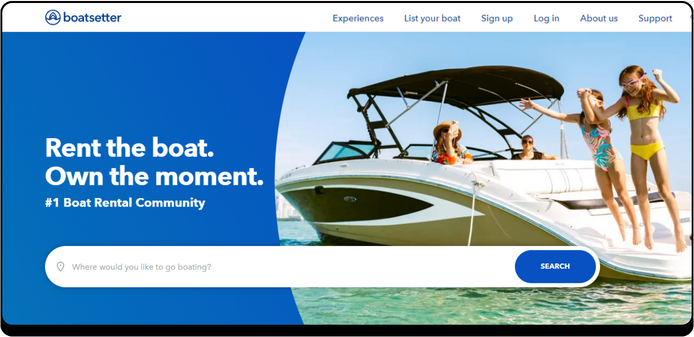
Set your availability:
Determine when your boats are available for rent and block off any dates when the boats are not available.
Screen renters:
Screen renters carefully to ensure they are qualified to rent your boats. This may include checking their boating experience, requiring a valid driver’s license, and obtaining a deposit to cover potential damages.
Provide instructions and support:
Provide detailed instructions on how to operate the boat safely and effectively. Be available to answer any questions renters may have before, during, and after their rental.
Maintain your boats:
Keep your boats in good condition by conducting regular maintenance and repairs. This will help ensure the safety of renters and prolong the lifespan of your boats.
Post High-Quality Photos of Your Boat:
Upload five or more pictures of your boat so people can see what they are renting. Take some time to look up how other renters took pictures of their boats to give you inspiration on how you can do too. It’s even helpful when the renters have a good review!
Write detailed listings:
Include clear and detailed descriptions of your boats, including photos, specifications, and amenities. Write a description about your boat, how long your boat is, how many guests it can fit, and featured accessories like a stereo system. Depending if your boat is rented out on a large or smaller body of water, include anything that newbie renters need to know, like wake times and any rules that the body of water operates under (hours of operation, noise, etc).
Have a checklist on hand.
You want to have a checklist for inventory and damage purposes before and after each person rents. The Peer-to-Peer companies may have a detailed checklist ready for you, but it may be best to have one of your own. If it makes you feel better, record the boat’s condition inside and out with videos or photos before each rental just in case you need it for disputes later. Once again, you can hire a part-time employee to handle this task.
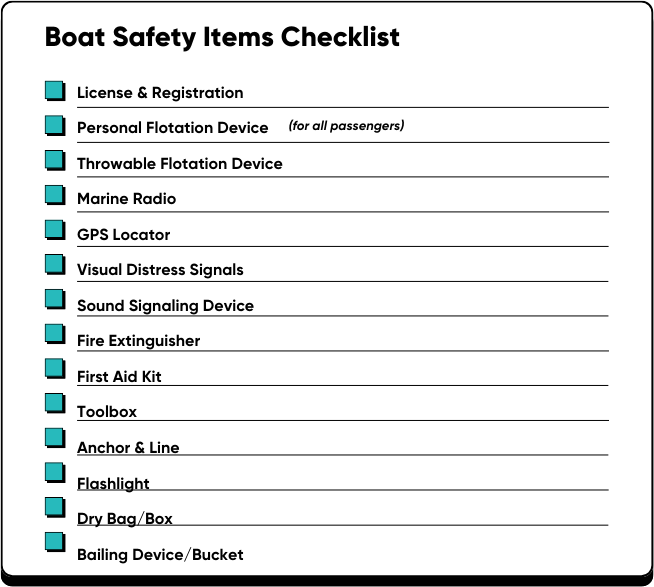
Step 6: Market your boats
Once your boats are ready for rental, it’s time to market them to potential customers through advertising, social media, and other marketing channels to attract business. You want to get the word out about your boat as much as you can so you can start connecting, renting, and racking in the dough!
Here are a few ideas to consider:
- Online marketing: Utilize search engine optimization (SEO) techniques to improve your website’s visibility in search results. Create and maintain social media accounts to connect with potential customers and share information about your boats, services, and special offers. You may also want to consider running paid ads through Google ads or social media platforms.
- Boat rental platforms: List your boats on reputable boat rental platforms such as Boatsetter, GetMyBoat, or Click&Boat, where renters can easily find and book your boats.
- Referral programs: Offer incentives for customers who refer others to your boat rental company, such as discounts on future rentals or additional rental time.
- Local advertising: Advertise your boat rental company in local newspapers, magazines, and event listings. Participate in local boating events and sponsor community events to increase brand awareness.
- Email marketing: Collect customer email addresses and send regular newsletters or promotional emails to keep customers engaged and informed about your boats and services.
- Reviews and testimonials: Encourage satisfied customers to leave reviews and testimonials on your website or social media accounts to build trust and credibility with potential customers. A few ways to ensure that you receive good reviews are by offering good customer service, communicating quickly and efficiently, and ensuring you are meeting expectations that you’ve set with your renters.
- Partner with other businesses: Partner with local hotels, restaurants, and tourist attractions to cross-promote your services and increase exposure to potential customers.
- Networking: Never forget the power of partnerships and collaborations. Have a friend who rents out a lake house? Ask if you can put your boat there for people to rent out as well. Partner with local marinas, hotels, and visiting centers that will point people in your boat rental direction.
Step 7: Consider additional offerings
Boat rental companies can offer a variety of amenities to enhance the rental experience and provide added value to renters Depending on which types of boats you’ll offer to your market, you may want to include (either for free or for an additional fee) amenities and supplies, such as:
- Safety equipment: Ensure that all boats come equipped with all necessary safety equipment, such as life jackets, fire extinguishers, and first-aid kits.
- GPS and navigation equipment: Provide navigation equipment, such as GPS and charts, to help renters navigate the waters safely.
- Audio and entertainment systems: Install audio and entertainment systems on board, such as Bluetooth speakers, radio, or even a TV, to enhance the renter’s experience.
- Water sports equipment: Offer water sports equipment, such as wakeboards, waterskis, snorkling gear, or tubes, for renters to enjoy during their rental.
- Food and drink services: Offer food and drink services, such as catering, a stocked cooler, or a bar, for renters to enjoy on board.
- Luxury features: Depending on the type of boat, consider including luxury features such as air conditioning, a hot tub, or a grill.
- Experienced captain or crew: Offer the option of renting a boat with an experienced captain or crew to provide renters with a stress-free and enjoyable boating experience.
By offering these extra amenities, you can ‘wow’ your customers, provide added value, and make their rental experience more enjoyable and memorable.
Bonus
Let’s take it to the next level. Instead of just renting out the boats, what if you could also offer storage opportunities for boat owners? We’re going to break down three storage ideas: On land storage, on the water storage, and Marinas.
On Land Storage.
- Location. Be accessible with plenty of room for boat trailers to maneuver safely along with their vehicles and be close to a body of water that’s connected to major highways.
- Financing. Because starting a boat storage business can be expensive, check out the SBA 504 program that can help with financing. This loan allows 10% down for acquisitions and 15% for new construction. The 10% down payment can come from borrowed funds. As a general rule, the more basic the land, the better chance of you being financed.
- Types of storage. What kind of storage can you provide? There’s open storage, outdoor coverage storage, warehouses for storage, unit-type storage, and condo storage.
- Permitting + Zoning. Just because you find a piece of land for your boat storage doesn’t mean you’ll receive zoning permits. Check-in with the authorities to make sure the land you’re looking into isn’t near HOAs who don’t want an “eyesore” in front or near their land.
- Amenities. What will you need to consider? You can have open land with aisles for people to park their boats or you can have an indoor facility. Provide motorized door operators for indoor storage, power hookups, a wash bay, an ice machine, and security features like a fence and video surveillance.
- Finding Customers. While you can certainly do the traditional marketing (newspapers, sponsor events, host your own events, and word of mouth) and online marketing (Google ads, social media ads, and newsletters), you can research marinas in your area to talk to the owners one on one to form a partnership with them to give your boat storage facility a boost in referrals and profits.
On the Water Storage.
Instead of owning the entire marina or an on-land storage facility, you can provide storage on the water where you own slips or buy slips to rent them out as storage.
- Finding Slips. Find docks to buy at Docksearch.com, Dockskipper.com, and dockforrent.com
- Financing. Just like buying a house mortgage, financing a dock or slip is the same way. Expect to pay real estate taxes, closing fees, and the whole shebang with monthly dues of services, much like an HOA if you’re buying your slip from a marina.
- Listing Your Slip. Snagaslip.com, Docksearch.com, or the P2P app, Dockshare.
- Revenue. Typically, it’s $20 to $50 per foot of boat for outdoor storage, per season. However, you want to look at what marinas in your local area are charging to set a competitive rate for your slip.
- Amenities. When providing storage opportunities, can you provide perks like swimming pools, clubhouses, WiFi, dock boxes, and more? Make your dock or slip as attractive as possible!
- Storage. If you will be providing storage for your customer’s boats, then it is best practice to have your customers sign a Marina Storage Agreement.
Marinas
Owning a marina is the ultimate up-leveling in the boating industry. If you are able to acquire a marina, not only will it provide a physical location for your boat rental company to operate from, it could also offer other boating-related services such as fuel, maintenance, and repairs.
A marina can also serve as a hub for water activities and social events, attracting more customers to the rental business. If you want a steady stream of recurring revenue from slip rentals, boat storage, and other services, and know that diversifying your company’s income streams is your end goal, we highly recommend marina ownership.
Check these sites to see which marinas are for sale:
- https://marinasforsale.com/
- https://www.svnmarinas.com/marina-listings/
- https://www.simplymarinas.com/marinas-for-sale/
Health Inspections. As a marina, your job is to ensure sewage is disposed of properly. Here’s a Marina Inspection Checklist to make sure you cover your bases so that when the state health department inspects your marina, it will pass with flying colors.
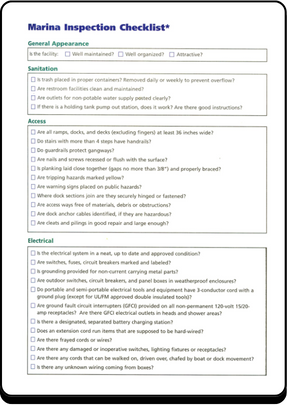
As a marina, you can charge anywhere between a few hundred dollars for a mooring season or $1,000/per month. Remember to charge for electricity, state tax, rates per length of the boat, and sewage pumps. The bigger the boat and the longer it’s docked at your marina, the more money you’ll make.
Mooring and Docking Fees. Renting boats or owning a marina, the length of the season, and the size of the boats being moored at your docks can impact how much you can make daily during the boating season. For a marina, you can charge each boat that needs mooring for electricity, state tax, day, weekly and monthly rates to dock, and lease taxes.
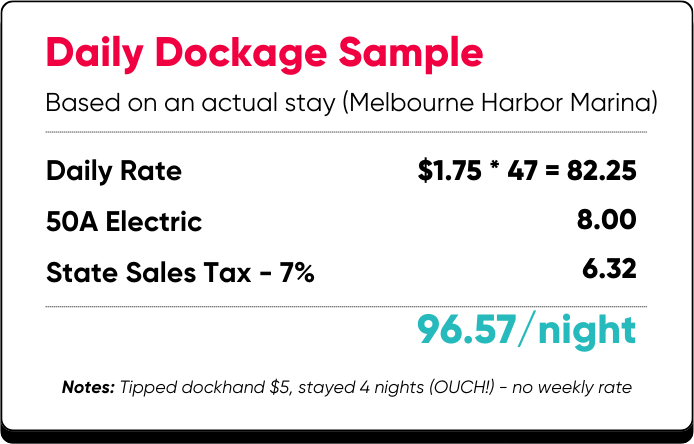
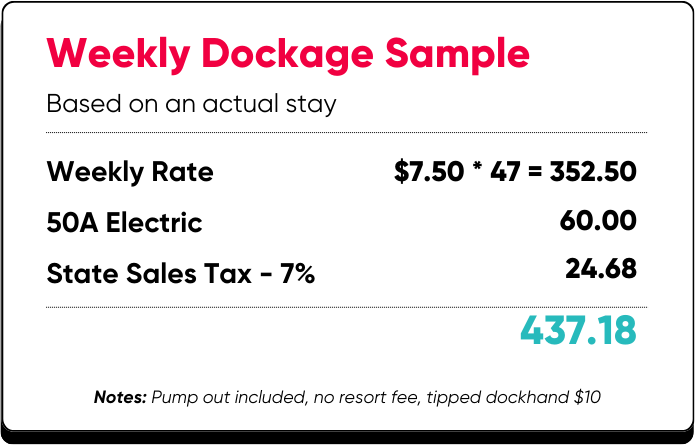
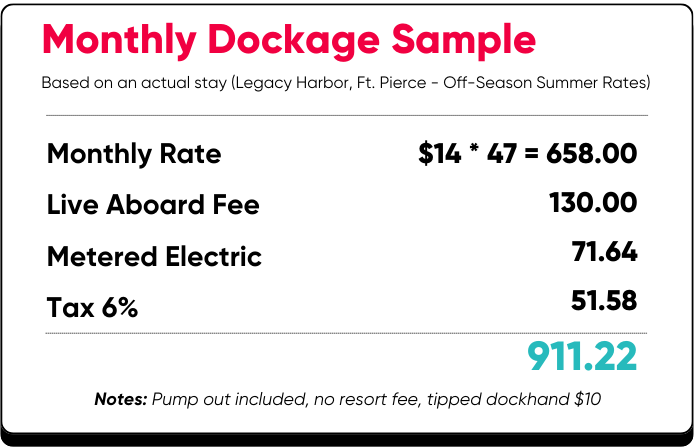
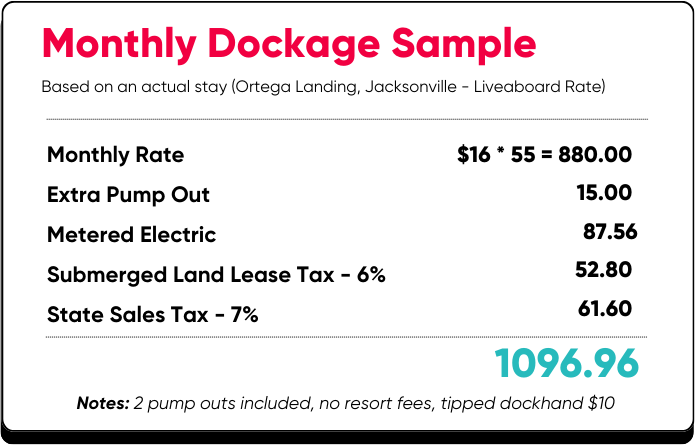
If you have 300-400 slips and 75% of those slips are being rented, then that’s a chunk of change right there.
Long-term stays. For boaters who plan to stay at your marina for longer than a month, give a discount. One marina’s monthly transient rate is $15/ft, but for longer stays, they charge $8.80/ft.
Inflation. Keep in mind that higher gas prices will affect your profit margin.
Boat Repairs and Maintenance. Calculate larger and ongoing expenses like maintenance costs, insurance premiums, licensing fees, and employee wages. Anticipate maintenance fees to be about 10% of the cost of each boat annually if you own any boats in your marina.
Takeaway
Whether you’re owning a marina that rents out boats or you’re renting out your own boat, you can generate thousands of dollars in revenue every month when you have done your due diligence to create a life of leisure on the open sea.
Ready to jump into our more advanced content? We’ll meet you where you’re at.
Want to learn investing basics and how we think about money? Check out Investor OS.
Want to learn how to grow an audience to build your wealth? Check out Build Your Newsletter.
Want to learn how to buy a cashflowing business? Check out The Business Buying Course.
Or, are you serious about buying a business within the next year? Check out Contrarian Community.

